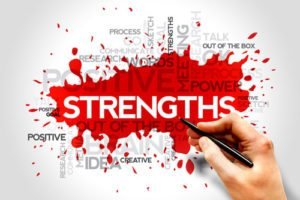
To properly prepare for a job interview or to craft a more impactful résumé, at some point you need to identify your skills and strengths. As in previous articles, a ‘strength’ is a skill that you are both good at and enjoy doing. Everybody has skills they are good at but don’t really like doing, so it is better to focus on those that you do enjoy – work using your strengths leads to job satisfaction, fulfilment, and happiness at work.
So, how should you go about compiling your skills and strengths? Firstly, look at your current job – what skills do you use everyday, regularly, and infrequently? Open a file on your computer and start listing these skills. You need to reflect on your job – on what you actually do to meet your objectives. As you list your skills, make a separate list of those you are good at and those you enjoy doing – i.e. your strengths.
Then examine what you did in your previous job and list the skills you used for that. There is no need to repeat any skills you have already listed. You will probably find that there is a large overlap between the skills you use in your current position and those you used in your last job, but make sure to identify those that you no longer use.
Move on to the next job, and then the next, and so on until you have listed all the skills you have used in every position you have held to-date. Depending on your age and experience, identifying and listing your skills can be a tedious task, so perhaps do it over a few days. Doing it this way will not only prevent becoming overwhelmed by the task, but will also result in a more complete list of your skills as your subconscious mind will still be working on identifying your skills even when you are not consciously doing so!
When you have listed all of the skills you have used in your work, both current and past, write a list of all the achievements you are proud of in your life. These achievements will be from both your work life and non-work life, and may include events such as getting a degree, getting married, becoming captain of a sports team, etc. When you have listed the achievements you are proud of, ask yourself what these say about you. For example, getting a degree might say you are studious and disciplined, while passing your driving test at the sixth attempt might say you are determined, motivated and resilient. Then identify the skills you used in these achievements. Since you are proud of these achievements, you most likely used skills you are both good at and enjoy doing – i.e. strengths.
The next step is to identify skills you use outside of work – these are important too. For each of your leisure activities and hobbies, list the skills you use in each. If you are in a leadership position related to any of these, note the skills associated with that role. Some people realise that they have finance ‘strengths’ they use as treasurer of a club, or organising skills they use as secretary of a group. Others identify counselling related skills from voluntary work they do with their faith group or from their involvement in a local youth club or elderly befriending group. List all these skills as some will be strengths and many may well be transferrable skills that an employer might be interested in.
This exercise of identifying your skills and strengths may be a tedious task, but it is also very revealing about yourself. Most people are not aware of all the skills they possess, nor of their strengths, and the process of identifying them is great for their self-esteem. One of the rewards of completing this task is that you will feel better about yourself afterwards. You will also have a realistic list of your skills for updating your résumé, and won’t have to think too hard when you are asked to discuss your strengths at an interview.
